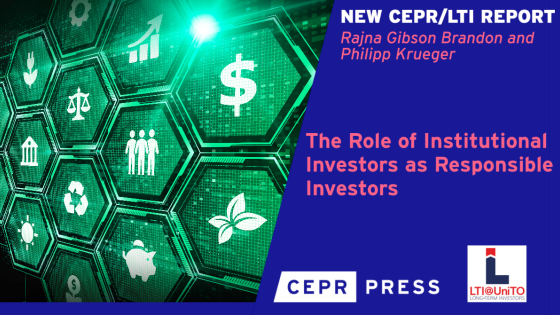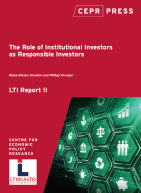The report is the second in a series produced in partnership with the Long-Term Investors think tank at the Università di Torino, and provides expert observations into this growing global investment trend. The authors analyse large sets of ESG scores and institutional investors’ portfolios’ data on both sides of the Atlantic to identify key stylised facts, investment patterns and future challenges of this key field in finance.
Central takeaways of the report include:
- Long-term orientation, cultural norms and values, and legal origins all play crucial roles in shaping investment motivations. Examining investment strategies, the report finds that screening, engagement, and ESG integration are the most commonly employed techniques. Sustainability themed investments, meanwhile, remain a niche area in this space.
- ESG investment strategies are effective in significantly reducing institutional investors' total and idiosyncratic risk exposures. However, these strategies do not have a significant impact on their equity portfolios' risk-adjusted returns. For ESG portfolio-level outcomes, only screening-based approaches are found to be positively related.
- There is some evidence that responsible investors align their portfolios with their ESG promises. However, this varies according to geographic location. ‘Greenwashing’, meanwhile, has increased over time and is more common in the United States than in Europe, a gap which is likely to widen as more stringent European sustainable finance regulation is introduced.
- Large ESG product innovation and growth is occurring in the sustainable fixed-income market. A new class of sustainability-related fixed-income instruments, ‘sustainability-linked bonds’ (SLBs), are predominantly issued in Europe by large, more leveraged, more profitable, and value-driven firms. However, these instruments are often complex and can be mispriced at the time of issuance. This mispricing may result in an unintended transfer of wealth from 'sustainable' bondholders to shareholders.
- Responsible shareholders who engage with firms can be effective in pushing sounder and more efficient environmental, social, and governance policies through their responsible equity and fixed-income investment strategies. However, it is less clear that they have real economic impact.
- There are significant challenges impeding institutional investors to act as responsible investors, such as conflicting financial motives, insufficient standardisation in ESG measurement and reporting practices, and methodological and data-related discrepancies leading to ESG rating discrepancies.
Overall, the policy insight sheds new light on the complex world of sustainable finance and provides useful analysis on the future outlook and issues that responsible investors will have to face.
Join the authors Rajna Gibson Brandon (University of Geneva) and Philipp Krueger (University of Geneva), editor Pietro Garibaldi (University of Torino, LTI@Unito and CEPR) and moderator Cédrik d’Aviau de Ternay (Generali France) for the presentation and discussion of this report on 05 April at 16:00 CET. Register here.



